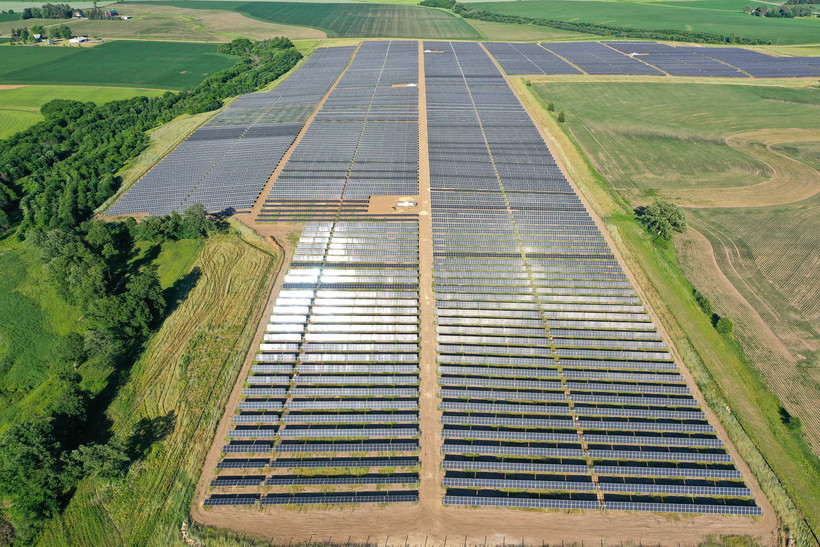Clean Energy Jobs Rebound After Pandemic Losses
But like other industries, jobs still lower than pre-pandemic levels.

The first 150 megawatts of the 300-megawatt Badger Hollow solar farm went online on Dec. 1, 2021. Wisconsin Public Service and Madison Gas and Electric own the project, which was developed by Invenergy. The first phase is expected to power 45,000 homes. Photo courtesy of Wisconsin Public Service
Wisconsin now has more than 71,000 clean energy jobs following declines due to the COVID-19 pandemic, but the state gained back less than a third of the jobs lost during the economic downturn.
The findings are part of the latest Clean Jobs Midwest report released by nonpartisan business group Environmental Entrepreneurs and nonprofit organization Evergreen Climate Innovations. Despite COVID-19 setbacks, clean energy advocates say billions of dollars of investment through the Inflation Reduction Act and bipartisan infrastructure law are setting the stage for significant growth.
Wisconsin added more than 2,000 jobs last year — a nearly 3 percent increase from 2020. More than half of those jobs were added in the clean vehicle sector as automakers shift to electric vehicles.
Clean energy jobs in the state grew at a slower rate last year than the Midwest as a whole, which increased 5 percent across the region. The Midwest added more than 714,000 jobs in 2021, gaining back roughly half the jobs lost during the downturn. As the nation saw record job growth last year, the report states clean energy jobs in Wisconsin and the Midwest grew faster than the overall economy.
Wisconsin’s clean energy industry is rebounding from the effects of COVID-19 and pandemic restrictions that prevented energy efficiency workers from entering buildings to weatherize or rehabilitate them.
“We saw that work pretty much stopped at the beginning of the pandemic because site visits were pretty much impossible to do at that time,” said Francisco Sayu, emerging technology director for RENEW Wisconsin. “But the industry shifted really quick. … We saw the advent of remote site visits, and things like that to continue doing the work.”
In 2021, the state saw job gains in areas like renewable energy and energy efficiency. Workers who install energy efficient lighting, air conditioning and ventilation represent the vast majority of clean energy jobs, accounting for 79 percent of such jobs in Wisconsin.
“That percentage is higher than for any other state in the Midwest,” Sayu said.
The state ranks 17th in the nation for the number of clean energy jobs. Neighboring states like Illinois and Michigan are listed among the top 10 states for employment in the clean energy sector, although Wisconsin boasted more clean energy jobs than Minnesota. While Wisconsin doesn’t have the highest number of jobs, Sayu said the state is on par with Michigan and Indiana with the number of clean energy jobs in proportion to its population.
With a significant infusion of federal funding, Preskill with Environmental Entrepreneurs said the industry is poised to see more growth than ever before. Wisconsin alone is set to see around $4 billion for large-scale renewable energy and storage through 2030 under the Inflation Reduction Act.
“There’s never been more stability and certainty in the market,” Preskill said. “Clean energy companies know that they can and should set up shop and stay here in the U.S. and the industry is destined to grow.”
Democratic Gov. Tony Evers released the state’s Clean Energy Plan earlier this year. That plan seeks to speed up deployment of clean energy projects, maximize energy efficiency, update building codes and support the transition to electric vehicles. The plan estimates Wisconsin could create more than 41,000 jobs by 2030.
Republican lawmakers have also introduced bills to remove barriers to solar development and invest in electric vehicle charging infrastructure. Even so, the state Legislature hasn’t acted on many climate and clean energy proposals. Assembly Speaker Robin Vos, R-Rochester, said a package of nearly two dozen bills put forth by Democrats last year was “pandering to the very liberal base.”
In June, Democrats announced plans to bring back a climate and jobs package in January next year that would include targets to cut greenhouse gas emissions and a program for green job training. Senate Majority Leader Devin LeMahieu, R-Oostburg, accused Democrats of moving forward with a “‘Green New Deal’ disaster” that would hurt families struggling financially amid rising gas prices.
Sayu with RENEW Wisconsin noted the state spends more than $14 billion on out-of-state production of fossil fuels each year. Sayu said that money could be spent in Wisconsin on renewable energy that creates new sources of revenue for farmers.
“Even if you don’t care about climate change, we have an economic opportunity here. There is money to be made in this market,” Sayu said. “If we don’t do it, other states will.”
Listen to the WPR report here.
Editor’s note: RENEW Wisconsin is an underwriter of WPR.
Clean energy jobs rebounding in Wisconsin after COVID-19 declines, but still below pre-pandemic levels was originally published by Wisconsin Public Radio.





















